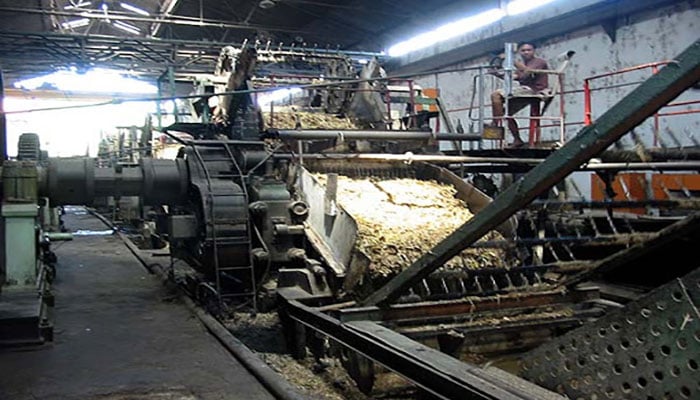Sugar industry agrees to start crushing on govt notified dates
LAHORE: The Punjab government, after the Lahore High Court stayed the sugarcane crushing season 2020-21, has started relying on the top beneficiaries of the sugar exports and price hike scam the JDW Group and the Al-Moiz Group.
The top two gainers of the exports subsidy which resulted in sugar shortage and price hike have assured the government to comply with the orders of early start of sugarcane crushing season to bring themselves in ‘good books’ of the government. Interestingly, the owners of the both groups went abroad when the government instructed the departments concerned including the Federal Investigation Agency (FIA) and the Competition Commission of Pakistan (CCP) to initiate inquiries in the light of recommendations of the report of the Sugar Commission headed by Wajid Zia.
On the other side, the rest of the industry officials stayed in the country, but the government started taking coercive measures by introducing different amendments to the Sugar Factories Act through ordinances.
On Friday, Cane Commissioner Punjab Zaman Wattoo, following the Lahore High Court orders of staying the notification of the Punjab Food Department regarding the start of the sugarcane crushing season 2020-21 by November 10 and 15 for South and Central regions respectively, said that the majority of sugar mills will not go with the petitioner mill. “They are starting crushing on 10th,” he said, adding that the JDW and the Al-Moiz Groups assured the government about early start of crushing season besides notifying about the start of the crushing season to the department.
However, contrary to this, the petitioner sugar millers talking to The News said that they had already decided to follow the government notification of early start of crushing season. The objective behind approaching the court was to sensitize the government that no industry could operate with such coercive measures introduced through amendments to the law through ordinances.
“We had already conveyed and assured the government in a meeting with Chief Minister Usman Buzdar and Prime Minister’s Advisor Shahzad Akbar that the industry does not want to embarrass the government. We want to corporate with the government and requested withdrawal of measures taken through ordinances.”
However, even after the meeting, another ordinance and notification were issued for early start of sugarcane crushing season on November 10 and 15 in South and Central Punjab respectively. After this the industry approached the Lahore High Court which stayed the Punjab government notification.
The industry officials said that even after the LHC stay order, crushing would start within the dates notified by the government. The industry wants to corporate with the government and early start of sugarcane crushing season is a positive gesture given by the industry. They said sugar mills are bound to operate as keeping the mills closed is not finically viable. So the government should stop harassing the sugar industry.
Currently, the sugar rates are already high in the market and every mill wants to avail the opportunity of higher rates to maintain its cash flows and minimize carrying the stocks for the year. However, the higher rates will start reducing once the crushing season touches its peak and everyone will attempt to sell maximum sugar at the highest rates. The sugar dealers are already sensitive to hold sugar as the government has declared them hoarders and confiscated their stocks during the last six months. So now everyone in the sugar business is sensitive, which can create a liquidity crunch for the sugar mills that can impact the sugarcane growers in getting their payments.
In the past too when the sugar industry faced liquidity crunch, they had offered the farmers to lift sugar against their sugarcane. However, the government has already announced coercive measures against the sugar millers on delaying payments to the sugarcane growers. This situation could create a critical situation for all stakeholders.
-
 James Van Der Beek’s Family Faces Crisis After His Death
James Van Der Beek’s Family Faces Crisis After His Death -
 Courteney Cox Celebrates Jennifer Aniston’s 57th Birthday With ‘Friends’ Throwback
Courteney Cox Celebrates Jennifer Aniston’s 57th Birthday With ‘Friends’ Throwback -
 Camila Cabello Shares Update On Her Hair Two Years After Going Platinum
Camila Cabello Shares Update On Her Hair Two Years After Going Platinum -
 Prince William Steps In To Help Farmer's Awareness Mission
Prince William Steps In To Help Farmer's Awareness Mission -
 Queen Elizabeth Tied To Andrew's Sexual Abuse Case Settlement: Report
Queen Elizabeth Tied To Andrew's Sexual Abuse Case Settlement: Report -
 Mark Ruffalo Urges Fans To Boycott Top AI Company Boycott
Mark Ruffalo Urges Fans To Boycott Top AI Company Boycott -
 Prince William Joins Esports Battle In Saudi Arabia
Prince William Joins Esports Battle In Saudi Arabia -
 Princess Beatrice, Eugenie Are Being Ripped Apart: ‘Their Relationship Is Fully Fractured’
Princess Beatrice, Eugenie Are Being Ripped Apart: ‘Their Relationship Is Fully Fractured’ -
 Arden Cho Shares Update On Search For ‘perfect’ Wedding Dress Ahead Of Italy Ceremony
Arden Cho Shares Update On Search For ‘perfect’ Wedding Dress Ahead Of Italy Ceremony -
 Ariana Madix Goes Unfiltered About Dating Life
Ariana Madix Goes Unfiltered About Dating Life -
 Prince William Closes Saudi Arabia Visit With Rare Desert Shot
Prince William Closes Saudi Arabia Visit With Rare Desert Shot -
 Priyanka Chopra Breaks Silence On Rumors Questioning Marriage To Nick Jonas
Priyanka Chopra Breaks Silence On Rumors Questioning Marriage To Nick Jonas -
 'King Charles Acts Fast Or Face Existential Crisis' Over Andrew Scandal
'King Charles Acts Fast Or Face Existential Crisis' Over Andrew Scandal -
 Brooklyn Beckham Charging Nearly £300 In Ticket Cost For Burger Festival
Brooklyn Beckham Charging Nearly £300 In Ticket Cost For Burger Festival -
 Prince William Makes Unexpected Stop At Local Market In Saudi Arabia
Prince William Makes Unexpected Stop At Local Market In Saudi Arabia -
 Zayn Malik Shares Important Update About His Love Life
Zayn Malik Shares Important Update About His Love Life




